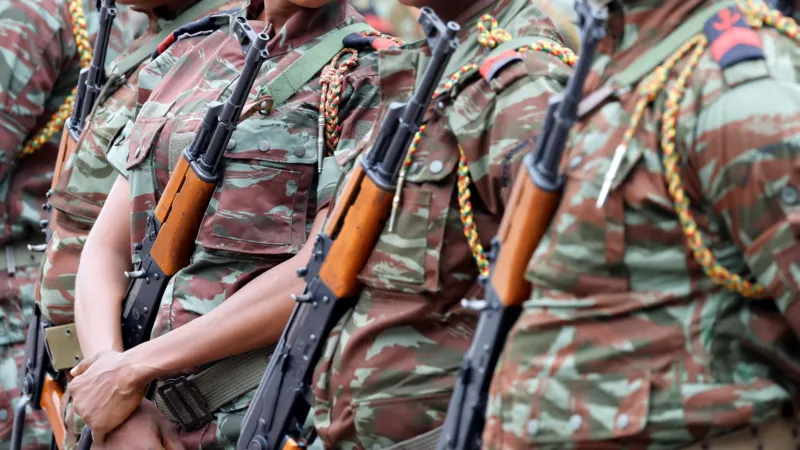
Northern Benin witnessed its bloodiest military attack in recent memory when jihadist militants from the al-Qaeda-linked group Jama’at Nusrat al-Islam wal Muslimeen (JNIM) launched a devastating assault that left 54 Beninese soldiers dead. The ambush, which occurred near the nation’s border with Burkina Faso and Niger, serves as a chilling reminder of how West Africa’s militant threat is rapidly expanding toward the Gulf of Guinea.
JNIM, the jihadist faction behind the carnage, claims they took out as many as 70 soldiers during simultaneous attacks on military outposts in Koudou Falls and Point Triple, deep inside the Park W complex in Benin’s northern Kandi province. Though the government initially downplayed the toll, the revised figure—confirmed nearly a week later—underscores the scale of the tragedy.
A Chilling Assault on the Borderlands
The twin military posts targeted are part of a dense, forested national park region long known for its porous borders. Attacks in this zone aren't new, but nothing of this scale has ever unfolded on Beninese soil. Government spokesperson Serge Nonvignon described the ambush as a "national catastrophe," calling it the worst single-day military loss in modern Benin.
Footage released by JNIM—analyzed by the SITE Intelligence Group—shows insurgents parading seized weapons, including a heavy machine gun, mortar launcher, and what appears to be a reconnaissance drone. Their use of such equipment hints at increasing tactical sophistication.
Personal Insight: I’ve seen border towns like these firsthand—places where the line between safety and danger blurs. It’s gut-wrenching knowing how quickly violence can pour across these invisible lines.
Who Are JNIM and What Do They Want?
Formed in 2017 through the merger of several Mali-based jihadist factions, JNIM has grown into one of West Africa’s most formidable insurgent networks. Spearheaded by Iyad Ag Ghaly, the group adheres to a hardline Salafi-jihadist ideology and aims to oust Western influence and install strict Islamic governance.
Tactics of JNIM:
-
Hit-and-run raids, often executed by fast-moving convoys on motorcycles.
-
Exploitation of local grievances to win recruits, particularly among disaffected Fulani communities.
-
Cross-border infiltration via loosely guarded zones like the W-Arly-Pendjari park system.
Their recent use of drones suggests a leap in capability that could pose even greater challenges to national forces already stretched thin.
Strategic Concern: If regional security doesn't adapt quickly, these armed groups may soon wield the kind of tech and intelligence only seen in conventional warfare.
Benin’s Reaction: A Nation in Mourning, A Military on Edge
President Patrice Talon and top officials expressed both sorrow and resolve in the face of the tragedy. Government spokesperson Wilfried Léandre Houngbédji stated plainly: “We won’t give in.” Benin's Operation Mirador, a counterinsurgency initiative, is expected to intensify in the coming weeks.
Still, the country’s leaders have made no secret of their frustration over regional dynamics. Talon’s camp emphasized that if neighboring countries had similar defense presence along shared borders, these attacks might be preventable.
Personal Reflection: I spoke to a friend in Cotonou after the news broke—her tone was somber but proud. Despite the loss, there’s a palpable determination not to be intimidated.
Why Northern Benin? Why Now?
Benin’s increased vulnerability stems from its proximity to chaotic Sahel regions—specifically Burkina Faso and Niger, where recent military coups have left security forces in disarray. The retreat of international forces, including the French and UN peacekeepers, has created a vacuum that jihadist factions are exploiting with speed and precision.
Key Drivers of the Spillover:
-
Geographic Hotspots: The Park W corridor is a prime location for militant transit.
-
Weak Coordination: Border patrols are minimal or nonexistent across the triple-frontier.
-
Western Ties: Benin’s strategic partnership with the U.S. makes it a target for jihadist groups opposed to foreign influence.
Critical Thought: Can Benin walk the tightrope of accepting foreign aid without alienating locals who may see it as neo-colonial interference?
The Road Ahead: Can This Be Contained?
Stopping JNIM’s momentum won’t be easy, but experts say there’s still time for decisive action.
Actionable Steps:
-
Strengthen Regional Defense Pacts – Without buy-in from junta-led neighbors, cross-border patrols will remain ineffective.
-
Enhance Surveillance – With American and Rwandan support, Benin could dramatically improve intelligence gathering.
-
Invest in the North – Infrastructure, education, and economic incentives can undercut jihadist recruitment pipelines.
-
Community Partnerships – Local leaders, especially religious figures, could become vital allies in the ideological fight.
Tactical Note: A village elder in Mali once told a researcher, “Jihadists give us justice. The state gives us nothing.” Until that sentiment changes, this battle won’t be won by bullets alone.
Conclusion: A Nation Tested, a Region at a Crossroads
The attack that took 54 brave soldiers will forever mark a turning point in Benin’s national psyche. But it also highlights something bigger—a creeping insurgency that’s no longer confined to the Sahel. If West African nations don’t unite, the fallout will be felt not just in Benin, but across the entire Gulf of Guinea.
As citizens, observers, and global allies, we must pay attention—not only to the casualties but to the root causes behind them. If there’s one takeaway here, it’s this: The fight against extremism in West Africa isn’t just military—it’s moral, political, and deeply human.
